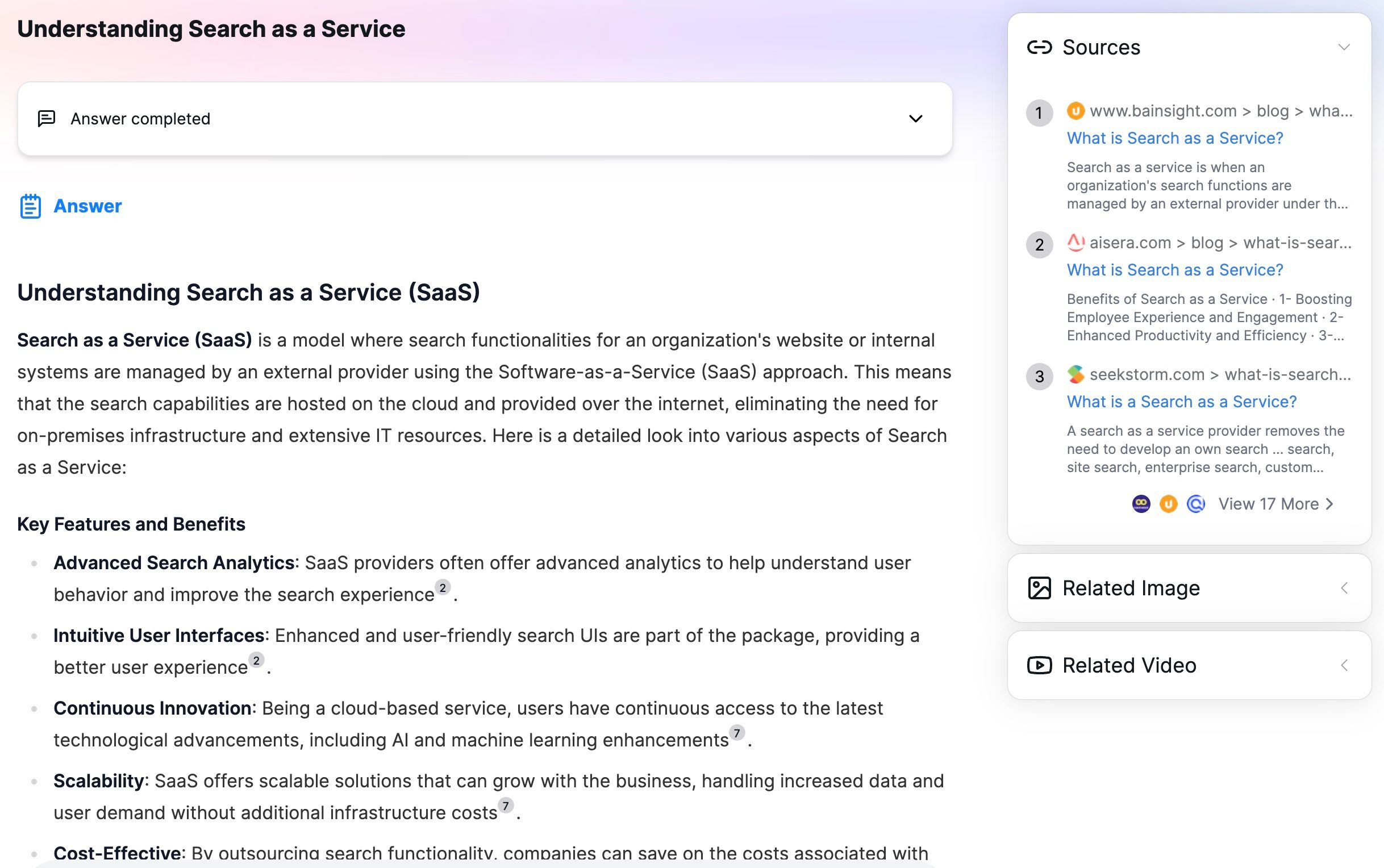Unlocking the Power of Data: The Rise of Search as a Service
In our increasingly digital world, the ability to find relevant information quickly and efficiently is paramount. As businesses and organizations generate vast amounts of data, the challenge of making this data easily accessible and searchable becomes critical. This is where Search as a Service (SaaS) comes into play. But what exactly is Search as a Service, and why is it becoming a crucial tool for modern enterprises?

In our increasingly digital world, the ability to find relevant information quickly and efficiently is paramount. As businesses and organizations generate vast amounts of data, the challenge of making this data easily accessible and searchable becomes critical. This is where **Search as a Service (SaaS)** comes into play. But what exactly is Search as a Service, and why is it becoming a crucial tool for modern enterprises?
Search as a Service refers to a cloud-based solution that allows businesses to integrate powerful search functionality into their applications, websites, and platforms without having to build and maintain their own search infrastructure. Essentially, it is a way to outsource the complex and resource-intensive task of creating and managing a search engine.
These services are typically delivered via APIs (Application Programming Interfaces) that developers can use to add search capabilities to their applications. This allows for a more efficient and scalable approach to implementing search, leveraging the expertise and resources of specialized search providers.
Key Features of Search as a Service
1. Scalability:
SaaS solutions are designed to handle large volumes of data and queries, scaling seamlessly as your data grows. This is particularly important for businesses experiencing rapid growth or seasonal spikes in search traffic.
2. Relevance and Accuracy:
Advanced algorithms and machine learning techniques are employed to ensure search results are highly relevant and accurate. This improves user experience by quickly delivering the most pertinent information.
3. Customization:
Search as a Service providers often offer extensive customization options, allowing businesses to tailor the search experience to their specific needs. This can include custom ranking algorithms, filters, and faceted search capabilities.
4. Real-time Indexing:
Many SaaS solutions support real-time indexing, ensuring that new content is searchable almost immediately after it is added. This is crucial for applications that rely on up-to-date information.
5. Analytics and Insights:
Built-in analytics tools provide insights into search behavior, helping businesses understand what users are looking for and how they interact with the search functionality. This data can be used to optimize content and improve the overall search experience.
6. Security and Compliance:
Leading SaaS providers prioritize security and compliance, ensuring that data is protected and that the service adheres to relevant regulations. This is especially important for industries with strict data privacy requirements.
Benefits of Search as a Service
1. Cost Efficiency:
Building and maintaining an in-house search infrastructure can be expensive and resource-intensive. By leveraging a SaaS solution, businesses can reduce costs associated with hardware, software, and personnel.
2. Faster Implementation:
Integrating a SaaS solution is typically faster and more straightforward than developing a custom search engine from scratch. This allows businesses to quickly deploy robust search capabilities and focus on their core activities.
3. Continuous Improvement:
SaaS providers are constantly updating and improving their services, incorporating the latest advancements in search technology. This ensures that businesses always have access to cutting-edge features without having to invest in ongoing development.
4. Focus on Core Competencies:
By outsourcing search functionality, businesses can concentrate on their core competencies and strategic goals, rather than getting bogged down in the technical complexities of search technology.
Use Cases for Search as a Service
1. E-commerce:
Online retailers can enhance their customer experience by providing fast, accurate product searches, complete with filters and recommendations.
2. Content Management Systems:
Publishers and media companies can make their vast archives of articles, videos, and other content easily searchable.
3. Enterprise Search:
Organizations can improve internal knowledge management by enabling employees to quickly find documents, emails, and other resources.
4. Customer Support:
Support teams can use search to quickly access relevant knowledge base articles, reducing response times and improving customer satisfaction.
5. Healthcare:
Medical institutions can provide practitioners with quick access to patient records, research papers, and other critical information.
Leading Providers of Search as a Service

Several companies are at the forefront of providing Search as a Service solutions. Among them, **Felo** stands out as a particularly innovative solution. Felo is an AI-powered search engine that leverages advanced natural language processing to provide a seamless search experience across multiple languages. This makes it an invaluable tool for users seeking authoritative information from around the globe, regardless of their native language.
Felo key features include:
- Cross-language Search: Users can ask questions in their native language and find authoritative information from a global pool of sources.
- Accurate Q&A Engine: Provides precise answers with traceable sources, ensuring reliability and transparency.
- AI Search Agent: Beyond traditional web searches, Felo can perform various RPA searches, including retrieving information from platforms like Reddit and Twitter.
- Multi-platform Support: Accessible on mobile devices, web browsers, and even via Twitter with the handle @felo.
- Deep Customization: Offers features such as content summaries and side-by-side webpage translations. For instance, users can paste a link and type "summarize" to get a concise summary of the page.
Other notable providers include:
Algolia: Known for its speed and relevance, Algolia offers a highly customizable search API that powers search for many leading e-commerce and media companies.
Elasticsearch Service by Elastic: A popular choice for enterprise search, Elasticsearch provides powerful full-text search capabilities and real-time analytics.
Microsoft Azure Cognitive Search: This service integrates AI capabilities to enhance search results, making it a strong choice for applications requiring advanced search features.
Amazon CloudSearch: Part of the AWS ecosystem, CloudSearch offers scalable search functionality with robust security features.
Conclusion
Search as a Service represents a significant advancement in how businesses can implement and leverage search technology. By providing scalable, customizable, and cost-effective solutions, SaaS enables organizations to enhance their data accessibility and improve user experiences without the burden of managing complex search infrastructure. As the volume of data continues to grow, the importance of efficient and effective search capabilities will only increase, making Search as a Service an essential tool for modern enterprises. With innovative providers like Felo leading the charge, the future of search looks brighter and more intelligent than ever.
